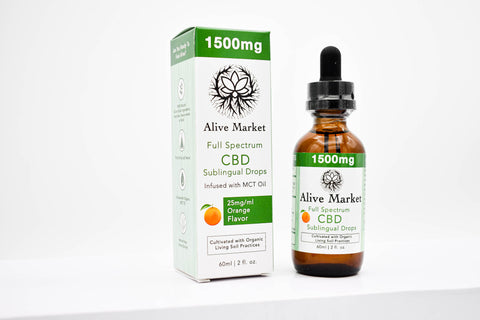As cannabis and marijuana use become increasingly legalized and normalized, many individuals are exploring their use for various purposes, from medicinal marijuana use to recreational marijuana use. However, alongside its potential benefits, regular cannabis and marijuana use can also lead to dependence, addiction, and withdrawal symptoms when marijuana usage is discontinued.
Whether you're transitioning away from frequent cannabis and marijuana consumption or seeking to take a break from marijuana use for personal or health reasons, navigating the marijuana addiction and marijuana withdrawal process can be challenging.
In this comprehensive guide, we delve into the realm of weed and marijuana withdrawal and withdrawal symptoms and explore the role that supplements play in easing the transition from cannabis dependence to sobriety and from cannabis abuse and cannabis withdrawal syndrome to cannabis dependence itself.
We understand that marijuana withdrawal and cannabis withdrawal symptoms can vary widely from person to person, ranging from mild discomfort to more severe manifestations of cannabis dependence and use disorders such as insomnia, anxiety, and mood swings. Recognizing the importance of holistic support during this time, we shed light on the benefits of incorporating supplements into your marijuana withdrawal management strategy.
From the calming properties of CBD oil to the sleep-regulating effects of melatonin, we'll examine a range of supplements that can help alleviate withdrawal symptoms and support your journey toward recovery from smoking weed. Additionally, we'll explore lifestyle factors and additional tips to complement your supplement regimen, empowering you to navigate smoking weed and withdrawal with confidence and resilience.
Join us as we embark on this journey toward greater understanding physical dependence and wellness, offering insights, support groups, and guidance to help you thrive beyond dependence.
The Role of Supplements in Weed Withdrawal
Why Supplements?
Withdrawal from cannabis can be a challenging process, often characterized by a variety of physical and psychological symptoms. While some individuals may experience mild discomfort, others may face more pronounced effects that interfere with daily life. In either case, finding effective strategies to manage withdrawal symptoms is crucial for a smooth and successful transition from marijuana addiction to sobriety.
Supplements offer a valuable adjunct to traditional approaches to withdrawal management, providing a natural and holistic means of addressing symptoms and promoting overall well-being. Unlike pharmaceutical interventions, which may carry the risk of side effects and dependency, supplements harness the power of natural compounds to support the body's own healing mechanisms.
Benefits of Using Supplements During Withdrawal
Natural Relief
Many supplements contain bioactive compounds derived from plants and other natural sources, offering a gentler alternative to synthetic medications. By leveraging the healing properties of nature, supplements can help alleviate drug withdrawal symptoms without introducing high doses of unnecessary chemicals or toxins into the body.
Targeted Support
Each supplement has its own unique set of properties and mechanisms of action, allowing for targeted support of specific symptoms. Whether you're struggling with sleep disturbances, anxiety, or cognitive impairment from mental illness, there's likely a supplement that can help address your needs and promote balance and stability.
Holistic Approach
Withdrawal from cannabis is a multifaceted process that involves both physical and psychological components. Supplements offer a holistic approach to cannabis withdrawal syndrome and management, addressing the underlying imbalances that contribute to symptoms and promoting overall health and vitality.
Empowerment and Self-Care
Incorporating healthy supplements into your withdrawal management strategy empowers you to take an active role in your own healing journey. By prioritizing self-care and nourishing your body with the nutrients it needs, you can enhance your resilience and pave the way for long-term recovery.
Key Supplements for Weed Withdrawal
CBD Oil: Nature's Ally
Introduction to CBD OilCBD, or cannabidiol, is a non-intoxicating compound found in the cannabis plant. Unlike its counterpart THC (tetrahydrocannabinol), CBD does not produce psychoactive effects, making it an attractive option for those seeking the therapeutic benefits of cannabis without the "high." CBD has gained widespread attention for its potential to alleviate a variety of symptoms, including pain, anxiety disorders depression, and insomnia. |
Mechanisms of Action in Weed Withdrawal
CBD interacts with the body's endocannabinoid system, a complex network of receptors and neurotransmitters related in regulating various physiological processes. By modulating activity within the endocannabinoid system, CBD can help restore balance and homeostasis, potentially mitigating withdrawal symptoms associated with cannabis cessation. Additionally, CBD has been shown to exert anti-inflammatory, anxiolytic, and neuroprotective effects, further contributing to its therapeutic potential during treatment of marijuana and withdrawal syndrome.
Dosage and Usage Guidelines
When using CBD for your cannabis withdrawal symptoms, it's essential to start with a low dose and gradually increase as needed. Dosage recommendations can vary depending on factors such as body weight, marijuana metabolism, and the severity of cannabis withdrawal symptoms alone. It's advisable to consult with a healthcare professional experienced in cannabinoid therapy to determine an appropriate dosage regimen tailored to your individual needs.
Potential Benefits and Side Effects
CBD has demonstrated promise in alleviating a range of withdrawal symptoms commonly associated with cannabis cessation. These may include anxiety, insomnia, mood swings, and cravings. By promoting relaxation and reducing hyperarousal of the nervous system, CBD can help ease the transition to sobriety and support overall well-being. However, it's important to note that CBD may not be suitable for everyone, and some individuals may experience side effects such as fatigue, dry mouth, or gastrointestinal discomfort. It's crucial to monitor your response to CBD closely and adjust your dosage accordingly to minimize any adverse effects.
Incorporating CBD oil into your withdrawal management strategy can provide valuable support during this challenging time. Whether used alone or in combination with other supplements, CBD offers the remarkable benefits of a natural and holistic approach to managing withdrawal symptoms and promoting a smoother transition to sobriety. As with any supplement, it's essential to approach CBD use mindfully and responsibly, prioritizing self-care and seeking professional guidance when needed. Join us as we explore additional supplements that can complement the therapeutic effects of CBD and enhance your journey toward recovery.
Melatonin: Regulating Sleep Patterns
 |
Role of Melatonin in Sleep RegulationMelatonin is a hormone produced by the pineal gland in response to darkness, playing a crucial role in regulating the sleep-wake cycle. As the primary regulator of circadian rhythms, melatonin helps synchronize the body's internal clock with the natural light-dark cycle, promoting restful sleep at night and wakefulness during the day. By modulating melatonin levels, individuals can experience improved sleep quality and duration, which are essential factors in supporting overall health and well-being. |
Addressing Insomnia and Sleep Disturbances
One of the hallmark symptoms of weed and marijuana withdrawal syndrome is insomnia, characterized by difficulty falling asleep, staying asleep, or experiencing restorative sleep. Disruptions to the endocannabinoid system, which plays a role in sleep regulation, can contribute to these sleep disturbances during the cannabis withdrawal syndrome, from cannabis and drug abuse or smoking, cigarette use or weed itself. Melatonin supplementation offers a natural and effective solution for managing insomnia and promoting better sleep hygiene.
Dosage Recommendations
Melatonin supplements are available in various forms, including tablets, capsules, and liquid formulations, typically ranging from 0.5 to 10 milligrams per dose. When using melatonin for weed withdrawal, it's advisable to start with a low dose (e.g., 0.5–3 milligrams) taken 30 minutes to an hour before bedtime. Gradually adjust the dosage as needed to achieve the desired effect while minimizing the risk of oversedation or grogginess the next day.
Combining Melatonin with Other Supplements
Melatonin can be used alone or in combination with other drugs, medications, and supplements to enhance its efficacy in managing sleep disturbances during weed withdrawal or treatment. Combining melatonin with CBD oil, for example, may offer synergistic effects by addressing both the underlying causes of insomnia (e.g., hyperarousal of the nervous system) and promoting relaxation and tranquility. However, it's essential to approach combination therapy cautiously and monitor your response closely to ensure your treatment has optimal results and minimal side effects.
Incorporating melatonin into your cannabis withdrawal management strategy can help restore healthy sleep patterns and promote overall well-being during this challenging time. By leveraging the natural sleep-promoting effects of melatonin, individuals can alleviate insomnia and other sleep disturbances associated with cannabis cessation, paving the way for a smoother transition to sobriety.
As with any supplement, it's crucial to prioritize self-care and seek professional guidance when needed to optimize your withdrawal experience and support long-term recovery. Join us as we explore additional supplements that can complement the therapeutic effects of melatonin and enhance your journey toward restful sleep and renewed vitality.
Magnesium: Calming the Nervous System
 |
Importance of Magnesium in WithdrawalMagnesium is an essential mineral involved in over 300 biochemical reactions in the body, including muscle and nerve function, energy production, and regulation of blood pressure. During weed withdrawal, disruptions to the endocannabinoid system can affect neurotransmitter signaling and lead to increased excitability of the nervous system. Magnesium plays a crucial role in modulating neurotransmission and promoting relaxation, making it a valuable supplement for managing symptoms such as anxiety and irritability during withdrawal. |
Alleviating Anxiety and Stress
Anxiety and stress are common symptoms experienced during weed withdrawal, often stemming from changes in brain chemistry and heightened sensitivity to stressors. Magnesium exerts anxiolytic effects by modulating the activity of the gamma-aminobutyric acid (GABA) neurotransmitter system, which helps inhibit neuronal excitability and promote a sense of calm and relaxation. By replenishing magnesium levels through supplementation, individuals can alleviate anxiety and stress and support emotional well-being during withdrawal.
Dietary Sources vs. Supplemental Forms
While magnesium is abundant in various foods, including leafy green vegetables, nuts, seeds, and whole grains, many individuals may not obtain sufficient amounts through diet alone, especially during times of increased stress or nutrient depletion.
Supplemental forms of magnesium, such as magnesium glycinate, citrate, or threonate, offer a convenient and bioavailable means of replenishing magnesium stores and achieving therapeutic effects. By choosing high-quality magnesium supplements, individuals can ensure optimal absorption and efficacy in managing withdrawal symptoms.
Dosage Considerations
Dosage recommendations for magnesium supplementation can vary depending on factors such as age, gender, and individual needs. For adults, typical dosages range from 200 to 400 milligrams per day, divided into two or three doses to enhance absorption and minimize gastrointestinal side effects. It's important to start with a lower dose and gradually increase as needed while monitoring for any adverse reactions. Consulting with a healthcare professional can help determine an appropriate dosage regimen tailored to your specific circumstances.
Incorporating magnesium into your withdrawal management strategy can help calm the nervous system, alleviate anxiety, and promote emotional well-being during this challenging time. By addressing underlying imbalances in neurotransmitter signaling and promoting relaxation, magnesium supplementation offers a natural and holistic approach to managing withdrawal symptoms and supporting overall mental health and vitality.
As with any supplement, it's important to prioritize self-care and seek professional guidance when needed to optimize your withdrawal experience and foster long-term recovery. Join us as we explore additional supplements that can complement the therapeutic effects of magnesium and enhance your journey toward emotional balance and resilience.
Omega-3 Fatty Acids: Supporting Brain Health
 |
Essential Role of Omega-3s in Brain FunctionOmega-3 fatty acids are polyunsaturated fats that play a vital role in supporting brain health and cognitive function. The two primary omega-3 fatty acids found in dietary sources are eicosapentaenoic acid (EPA) and docosahexaenoic acid (DHA), both of which are integral components of cell membranes and contribute to the structure and function of neurons. During weed withdrawal, individuals may experience cognitive symptoms such as brain fog, difficulty concentrating, and memory impairment, highlighting the importance of supporting brain health through adequate omega-3 intake. |
Managing Mood Swings and Cognitive Symptoms
Imbalances in neurotransmitter activity and inflammation can contribute to mood swings decreased appetite, and cognitive symptoms during weed and alcohol withdrawal. Omega-3 fatty acids exert anti-inflammatory effects and support the production of neurotransmitters involved in mood regulation, such as serotonin and dopamine.
By incorporating omega-3 supplementation into your withdrawal management strategy, you can help mitigate mood swings, keep your appetite, enhance cognitive function, and promote emotional stability during this transitional period.
Choosing Quality Omega-3 Supplements
Omega-3 fatty acids are primarily found in fatty fish such as salmon, mackerel, and sardines, as well as in certain plant-based sources like flaxseeds, chia seeds, and walnuts. While dietary sources are valuable for overall health, supplementation may be necessary to ensure adequate intake, especially for individuals who do not regularly consume fish or have increased omega-3 needs. When selecting omega-3 supplements, opt for high-quality products that contain a balanced ratio of EPA to DHA and undergo third-party testing for purity and potency.
Incorporating Omega-3s into Your Diet
In addition to supplementation, incorporating omega-3-rich foods into your diet can further support brain health and overall well-being during weed withdrawal. Aim to include fatty fish, such as salmon or trout, in your meals several times per week, and incorporate plant-based sources of omega-3s, such as flaxseeds or hemp seeds, into your daily diet. By diversifying your omega-3 intake through both supplementation and dietary sources, you can optimize brain function and promote resilience during marijuana withdrawal.
Incorporating omega-3 fatty acids into your withdrawal management strategy can support brain health, enhance cognitive function, and promote emotional well-being during this challenging time. By addressing underlying imbalances in neurotransmitter activity and inflammation, omega-3 supplementation offers a natural and holistic approach to managing mood swings, cognitive symptoms, and promoting overall recovery.
As with any supplement, it's essential to prioritize self-care and seek professional guidance when needed to optimize your withdrawal experience and foster long-term wellness. Join us as we explore additional supplements that can complement the therapeutic effects of omega-3 fatty acids and enhance your journey toward cognitive clarity and emotional balance.
Lifestyle Factors and Additional Tips
While supplements play a valuable role in supporting withdrawal from cannabis, it's essential to recognize that holistic wellness encompasses more than just what you ingest. Lifestyle factors and daily habits also play a significant role in managing withdrawal symptoms and promoting overall well-being during this transitional period. By prioritizing self-care and adopting healthy lifestyle practices, you can enhance the effectiveness of supplements and optimize your withdrawal experience. Here are some additional tips to consider:
Importance of Nutrition and Hydration

Eating a balanced diet rich in nutrient-dense foods is essential for supporting your body's natural detoxification processes and replenishing vital nutrients depleted during cannabis use. Focus on incorporating plenty of fruits, vegetables, whole grains, lean proteins, and healthy fats into your meals to provide your body with the fuel it needs to thrive. Additionally, staying hydrated by drinking plenty of water throughout the day can help flush out toxins and support optimal bodily function.
Regular Exercise: Boosting Mood and Well-being

Engaging in regular physical activity is an effective way to manage stress, boost mood, and promote overall well-being during weed withdrawal. Exercise stimulates the release of endorphins, the body's natural feel-good chemicals, which can help alleviate symptoms of anxiety and depression. Whether it's going for a brisk walk, practicing yoga, or hitting the gym, finding activities that you enjoy and incorporating them into your daily routine can make a significant difference in how you feel.
Mindfulness Practices: Managing Stress and Anxiety

Practicing mindfulness and relaxation techniques can help reduce cravings, soothe the nervous system and appetite, reduce stress, and promote emotional balance during withdrawal symptoms. Techniques such as deep breathing exercises, meditation, progressive muscle relaxation, and guided imagery can help calm racing thoughts and promote a sense of inner peace. Incorporating mindfulness practices into your daily routine can provide valuable tools for managing cravings, anxiety, and other withdrawal symptoms.
Seeking Professional Support When Needed

Finally, it's essential to recognize when professional support may be necessary to navigate the challenges of weed withdrawal successfully. If you're struggling to manage withdrawal symptoms all on your own or experiencing severe psychological distress, don't hesitate to reach out to a healthcare professional or mental health provider for guidance and support. They can offer personalized treatment recommendations, therapy, or medication options to help you manage withdrawal symptoms well, reduce anxiety, improve mood, and promote recovery effectively.
By incorporating these lifestyle factors and additional tips into your withdrawal management strategy and effective treatment throughout, you can enhance the effectiveness of supplements and support your overall well-being during this transformative journey. Remember that recovery from addiction and from drug use and alcohol abuse really is a process, and it's okay to seek help and support along the way. With dedication, perseverance, and the right tools, you can overcome weed withdrawal and emerge stronger, healthier, and more resilient than ever before.
Conclusion
In the journey of weed withdrawal, supplements play a crucial role in alleviating symptoms and supporting overall well-being. From CBD oil to melatonin, magnesium, and omega-3 fatty acids, these natural remedies offer cannabis users a holistic approach to managing marijuana withdrawal from symptoms and promoting recovery from drug and cannabis use disorders.
CBD oil, with its calming properties and ability to modulate the endocannabinoid system, provides relief from anxiety, insomnia, and mood disturbances commonly experienced during withdrawal. Melatonin regulates sleep patterns, helping individuals achieve restful and rejuvenating sleep essential for recovery. Magnesium calms the nervous system, alleviating anxiety and promoting emotional stability. Omega-3 fatty acids support brain health, enhancing cognitive function and emotional well-being.
Incorporating these supplements into your withdrawal management strategy, along with other substances, and adopting healthy lifestyle practices, such as proper nutrition, regular exercise, mindfulness, and seeking professional support when needed, can optimize your journey toward sobriety.
Remember, recovery from substance use disorders and substance abuse themselves is a process, and it's essential to be patient and compassionate with yourself along the way. By prioritizing self-care, seeking support from loved ones, and utilizing the resources available to you, you can navigate weed withdrawal with resilience and determination.
As you embark on this journey of healing and self-discovery, know that you are not alone. There is hope, support, and a brighter future awaiting you on the other side of withdrawal. Embrace the challenges, celebrate your progress, and trust in your ability to overcome adversity.
Together, we can break free from dependence, reclaim our mental health, and well-being, and live our lives to the fullest. Here's to a future filled with clarity, vitality, and endless possibilities. You've got this!


